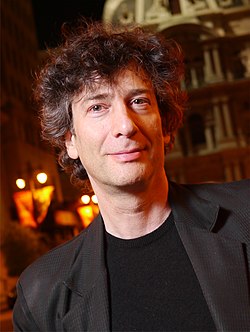Neil Gaiman Quote
How can you be happy in this world? You have a hole in your heart. You have a gateway inside you to lands beyond the world you know. They will call you, as you grow. There can never be a time when you forget them, when you are not, in your heart, questing after something you cannot have, something you cannot even properly imagine, the lack of which will spoil your sleep and your day and your life, until you close your eyes for the final time, until your loved ones give you poison and sell you to anatomy, and even then you will die with a hole inside you, and you will wail and curse at a life ill-lived.
Neil Gaiman
How can you be happy in this world? You have a hole in your heart. You have a gateway inside you to lands beyond the world you know. They will call you, as you grow. There can never be a time when you forget them, when you are not, in your heart, questing after something you cannot have, something you cannot even properly imagine, the lack of which will spoil your sleep and your day and your life, until you close your eyes for the final time, until your loved ones give you poison and sell you to anatomy, and even then you will die with a hole inside you, and you will wail and curse at a life ill-lived.
Tags:
other worlds, reading
Related Quotes
About Neil Gaiman
Neil Richard MacKinnon Gaiman (; born Neil Richard Gaiman; 10 November 1960) is an English author of short fiction, novels, comic books, audio theatre, and screenplays. His works include the comic series The Sandman (1989–1996) and the novels Good Omens (1990), Stardust (1999), American Gods (2001), Coraline (2002), Anansi Boys (2005), The Graveyard Book (2008) and The Ocean at the End of the Lane (2013). He co-created the TV adaptations of Good Omens and The Sandman.
Gaiman's awards include Hugo, Nebula, and Bram Stoker awards and Newbery and Carnegie medals. He is the first author to win the Newbery and the Carnegie medals for the same work, The Graveyard Book. The Ocean at the End of the Lane was voted Book of the Year in the British National Book Awards, and it was adapted into an acclaimed stage play at the Royal National Theatre in London.
Beginning in 2024, news outlets published sexual assault accusations against Gaiman by numerous women. This affected or halted production on several adaptations of his work. One accuser sued Gaiman and his estranged wife Amanda Palmer for rape and human trafficking. Gaiman has denied these allegations.
Gaiman's awards include Hugo, Nebula, and Bram Stoker awards and Newbery and Carnegie medals. He is the first author to win the Newbery and the Carnegie medals for the same work, The Graveyard Book. The Ocean at the End of the Lane was voted Book of the Year in the British National Book Awards, and it was adapted into an acclaimed stage play at the Royal National Theatre in London.
Beginning in 2024, news outlets published sexual assault accusations against Gaiman by numerous women. This affected or halted production on several adaptations of his work. One accuser sued Gaiman and his estranged wife Amanda Palmer for rape and human trafficking. Gaiman has denied these allegations.
